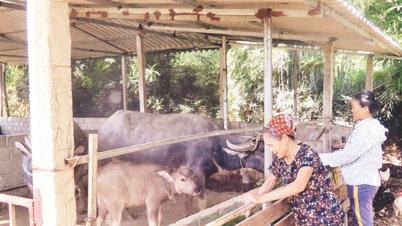Master, Specialist Doctor I Pham Hung, Department of Thoracic-Vascular Surgery, Tam Anh General Hospital , Ho Chi Minh City, said that patient NTN (66 years old) has had difficulty breathing and swallowing for two months now. The patient's neck is swollen due to a giant goiter, measuring 10x8cm.
CT images show that the goiter occupies the entire thyroid gland, compresses the trachea and esophagus, pushes the trachea to the right and hangs down into the chest (mediastinal goiter). This is a benign disease, indicating a condition in which the goiter (thyroid goiter) grows larger, beyond the neck and spreads to the mediastinum.
According to the patient, the goiter formed more than 40 years ago, at first it was just a medium sized tumor. Five years ago she went to another hospital for examination and was advised to have surgery, but partly because she was afraid of surgery and partly because the tumor did not cause any uncomfortable symptoms, she refused treatment.
Master, Specialist Doctor I Le Thi Ngoc Hang, Department of Thoracic-Vascular Surgery, Tam Anh General Hospital, Ho Chi Minh City, stated that goiter completely changes the structure of the patient's neck organs. The trachea is pushed from left to right, the esophagus is compressed, narrowing its diameter.
The tumor also compresses the blood vessels and organs in the mediastinum. If not operated on early, the tumor continues to grow and can cause many serious complications such as airway compression leading to life-threatening acute respiratory failure, difficulty swallowing, choking, hoarseness or vocal cord paralysis, chronic cough, choking, etc.
Doctor Hang assessed that because the tumor was “huge”, it had a lot of blood vessels, and the risk of bleeding and not being able to stop the bleeding during surgery was very high. In addition, the tumor was tightly attached to the surrounding tissues and organs, so there was a high possibility that the sternum would have to be cut open to remove it. However, the patient and his family wanted the surgery to be gentle, minimizing the risk of blood loss and infection. Therefore, the team decided to approach the tumor from the neck as usual, and if that was not possible, they would split the sternum.
The doctor made a 6cm incision in the neck, carefully removing the tumor to avoid puncturing the trachea, esophagus, and tearing large blood vessels. The surgery went smoothly. After 2 hours of hardship, the entire tumor was removed without opening the chest. The patient only lost a total of 80ml of blood (less than 100ml is within the safe limit). The subsequent pathology results determined that the tumor was benign.
The patient recovered quickly, without common complications after thyroid surgery such as bleeding, difficulty breathing, infection, voice changes, numbness in limbs, and hypothyroidism. She was discharged from the hospital 3 days later.
Dr. Hung informed that goiter accounts for 5-15% of goiter cases. Risk factors and causes of the disease include iodine deficiency, multinodular goiter, thyroid tumors, thyroid cysts, chronic thyroiditis, hormonal changes during pregnancy, autoimmune diseases (Hashimoto's and Graves'), and genetics.
15-50% of people with goiter have no symptoms for a long time. The disease is often discovered by chance when taking a chest X-ray or CT scan during another medical examination. As the goiter grows larger, symptoms begin to appear due to the goiter compressing the structures in the neck and chest, especially the trachea and esophagus. At this time, the patient will have difficulty breathing, difficulty swallowing, hoarseness, cough, wheezing, feeling of choking in the neck, chest pain, etc.
To reduce the risk of developing goiter, each person needs to ensure a diet with enough iodine, limit foods that promote goiter growth including cruciferous vegetables (cabbage, cauliflower, kale), soybeans, peanuts. Have regular health check-ups and thyroid exams.
Everyone needs to go to the doctor for timely and effective treatment of thyroid diseases such as hyperthyroidism, hypothyroidism, thyroiditis. Early intervention for goiters in the neck (due to any cause) to prevent the goiter from progressing and moving to the chest.
Source: https://nhandan.vn/loai-bo-khoi-buou-giap-khong-lo-cho-benh-nhan-post887175.html























![[Video] Resolution 18 creates new space and motivation for the press to change](https://vphoto.vietnam.vn/thumb/402x226/vietnam/resource/IMAGE/2025/6/21/778f0e5b41414095b0ca73f0cdd16744)




![[Photo] Overcoming the heat, practicing to prepare for the parade](https://vphoto.vietnam.vn/thumb/1200x675/vietnam/resource/IMAGE/2025/6/21/b93392e8da8243b8a32040d19590e048)

























![[Maritime News] Wan Hai Lines invests $150 million to buy 48,000 containers](https://vphoto.vietnam.vn/thumb/402x226/vietnam/resource/IMAGE/2025/6/20/c945a62aff624b4bb5c25e67e9bcc1cb)











































Comment (0)